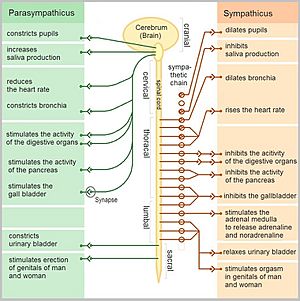Autonomic nervous system facts for kids
The autonomic nervous system (ANS) is like your body's automatic control system. It manages many things inside you without you even thinking about it! This system is sometimes called the 'involuntary nervous system' because its actions happen on their own. It's a key part of your peripheral nervous system, which connects your brain and spinal cord to the rest of your body.
The autonomic nervous system controls all your automatic actions. This means most of its work happens without you being aware of it. You usually don't feel what the ANS is doing. However, some of its activities, like breathing, can also work with your conscious mind.
The ANS controls many different things. These include your heart rate, how you digest food, your breathing rate, how much saliva you make, and how much you sweat. It also controls the size of your pupils and when you need to go to the bathroom.
There are two main parts within the ANS:
- The sympathetic nervous system: This part gets your body ready for action, like in a "fight or flight" situation.
- The parasympathetic nervous system: This part helps your body "rest and digest" after a busy time.
Contents
How the Autonomic Nervous System Works
The sympathetic and parasympathetic systems often do the opposite of each other. Think of them like a gas pedal and a brake pedal for your body. One speeds things up, and the other slows them down.
Here's a simple look at what each system does for different parts of your body:
| Target organ/system | Parasympathetic | Sympathetic |
|---|---|---|
| Digestive system | Increases movement and juices for digestion | Slows down digestion |
| Liver | No effect | Releases sugar (glucose) into your blood |
| Lungs | Narrows air tubes (bronchioles) | Widens air tubes (bronchioles) |
| Urinary bladder/Urethra | Relaxes the muscle that holds urine | Tightens the muscle that holds urine |
| Kidneys | No effects | Decreases how much urine you make |
| Heart | Slows down your heart rate | Speeds up your heart rate |
| Blood vessels | No effect on most blood vessels | Narrows blood vessels in some organs; increases blood pressure |
| Salivary and Lacrimal glands | Makes more saliva and tears | Slows down saliva and tear production (can cause dry mouth/eyes) |
| Eye (iris) | Makes pupils smaller | Makes pupils bigger |
| Eye (ciliary muscles) | Helps you see things up close | Helps you see things far away |
| Adrenal Medulla | No effect | Tells cells to release adrenaline and noradrenaline |
| Sweat gland of skin | No effect | Makes you sweat |
The Sympathetic Nervous System
This system prepares your body for a "fight-or-flight response". This means it gets you ready to either face a challenge or run away from danger. It gives you a burst of energy and slows down digestion.
Here's what it does:
- It sends more blood to your muscles and lungs. This means less blood goes to your stomach and skin.
- Your muscles can get a lot more blood – up to 12 times more!
- It opens up the air tubes in your lungs (bronchioles). This helps you breathe more air.
- It makes your heart rate go up.
- It makes your pupils bigger. This lets more light into your eyes and helps you see things far away.
- It tightens the muscles that control your intestines and bladder.
- It slows down the movement of food through your digestive system.
The Parasympathetic Nervous System
The parasympathetic nervous system helps your body "rest and digest." It calms your nerves and helps your body return to normal functions. It also helps with digestion.
Here are some things it does:
- It widens blood vessels that lead to your digestive system. This sends more blood there.
- It narrows the air tubes in your lungs when you don't need as much oxygen.
- It makes your pupils smaller.
- It makes your salivary glands produce more saliva.
The Enteric Nervous System
The enteric nervous system is a special part of your nervous system found in your digestive system. Some people call it "the Second Brain of the Human Body."
It has important jobs like:
- Feeling changes in your gut, like chemicals or movement.
- Controlling the release of juices in your gut.
- Managing the movement of food through your digestive system.
Images for kids
See also
 In Spanish: Sistema nervioso autónomo para niños
In Spanish: Sistema nervioso autónomo para niños
 | Tommie Smith |
 | Simone Manuel |
 | Shani Davis |
 | Simone Biles |
 | Alice Coachman |



